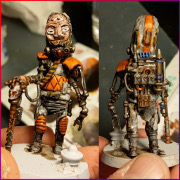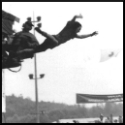|
Brown Moses posted:Here's a more detailed article about the airport capture from the NYT. From that article: quote:Rebels were also looting the terminals’ few office buildings, though after the airport had served as a Qaddafi military position for almost two months, there seemed to be little to steal. A few groups of rebels departed with their pick-up trucks stacked with little more than dingy office chairs. To be used as mobile anti-aircraft platforms no doubt. Perhaps these chairs are the captured equipment referred to in the Twitter reports.
|
|
|
|

|
| # ? May 16, 2024 09:07 |
|
A Winner is Jew posted:C-130's full of aid supplies? Right. They keep having delays with shipping in supplies, it sounds like. It can be difficult to secure the port, there were the mines and fires, and then verification of who's got what on their boat. It sounds like it would be a lot easier and a lot faster to fly in military cargo aircraft full of supplies, and also easier to fly out anybody that had to leave instead of waiting on ships.
|
|
|
|
Well there's this too. http://www.youtube.com/watch?v=2imnqC9vdnw&feature=share Some pictures of mobile rocket launchers presumably captured. I cant verify it's from the airport, but it's clear from the terrain around them as the jury rigged combat vehicle convoy drives off they're out of the city. Chronojam posted:Right. They keep having delays with shipping in supplies, it sounds like. It can be difficult to secure the port, there were the mines and fires, and then verification of who's got what on their boat. It sounds like it would be a lot easier and a lot faster to fly in military cargo aircraft full of supplies, and also easier to fly out anybody that had to leave instead of waiting on ships. The airport is a hell of a lot more exposed than the port. There's no reason it would be any easier to bring in supplies through the airport and several reasons it would be harder, beginning with sheer capacity.
|
|
|
|
farraday posted:Well there's this too. Those big rockets at 0:13 are SA-3 anti air missiles on transport trucks. They can't be fired from the trucks but are loaded onto an actual launcher from them.
|
|
|
|
farraday posted:Well there's this too. At 1:00, there's a tarted-up white truck with flame racing stripes. I just about laughed one I saw that. Also, that's a poo poo-load of ammo in the back of that one truck. farraday posted:The airport is a hell of a lot more exposed than the port. There's no reason it would be any easier to bring in supplies through the airport and several reasons it would be harder, beginning with sheer capacity. A good thing about this is the airport is the largest open area inside Misarata. If they can't land planes there, then they can at least conduct airdrops there. The reason they couldn't airdrop supplies before is that there was not enough open space for parachuting pallets to land.
|
|
|
|
Few more videos: Video of captured stuff https://www.facebook.com/video/video.php?v=114550425297566 https://www.facebook.com/video/video.php?v=10150243480188799 Families who were stuck in the airport and surrounding area: http://www.youtube.com/watch?v=Wj6nh_JYtS8&feature=share As I said earlier, I think for the airport to be safe they'd need to secure a 25km area around the airport to stop anything flying in being shot down by Gaddafi's longest range mobile AA missiles.
|
|
|
|
Brown Moses posted:Few more videos: If you want to know what they've got in the first video, they're Type 63 107mm artillery rockets. And, in the second video, that's a shitload of ammunition. That's a real boon there, especially if there's small arms ammunition and what not. Also, that shot of the boots reminds me of the D-Day film, The Longest Day, which has the repeated image of a German officer who has his boots on so quickly he doesn't realize they're on the wrong feet, all because of the quickness and surprise of the Allied invasion. The rebels moved so fast out from Misarata that the Qaddafi forces left behind even their boots.
|
|
|
|
Young Freud posted:The rebels moved so fast out from Misarata that the Qaddafi forces left behind even their boots. Seriously, what's with that? I've seen loads of pictures from across the middle east, either from abandoned battlefields or sites of stampedes, where people have left their shoes and boots behind.
|
|
|
|
Mr. Sunshine posted:Seriously, what's with that? I've seen loads of pictures from across the middle east, either from abandoned battlefields or sites of stampedes, where people have left their shoes and boots behind. Perhaps they were in the middle of prayer? Other than that I can only imagine the soldiers are not defensive battle ready and are completely oblivious to what is actually happening on the ground.
|
|
|
|
The-Mole posted:This is either from Libya or your average Middle Eastern wedding celebration. That's a picture of Israeli war crimes in Gaza where they bombed civilian targets with white phosphorous.
|
|
|
|
That was already covered on the last page doofus. quote:2:16am Libya's consul in Cairo told Al Arabiya television in remarks aired on Thursday that he was quitting his post to join rebel ranks. quote:
|
|
|
|
Reuters article about Gadaffi's reappearancequote:A screen behind Gaddafi showed a morning chat show on state al-Jamahirya television. A zoom-in on the screen showed Wednesday's date displayed in the corner.
|
|
|
|
May 12th Live Blogs AJE LibyaFeb17.com Feb17.info I've been reading that the rebels in the Nafusa region are starting to adopt the same tactics as the rebels in Misrata, basically blocking off roads with tonnes of sand and rubble, and working to encircle Gaddafi troops. Nafusa is pretty much all mountains, so blocking a road like that makes it impossible for vehicles to pass, and if you are unable to defend a road it's a great way to stop it being used to reinforce and resupply your enemy. The advantage that the Misrata rebels and Nafusa rebels have is they've had to learn to rely on infantry, and they have great local knowledge, so they understand how to move about the local terrain and what roads to block to cause the maximum problems, and they also don't have to rely on vehicles, so blocking roads don't cause them any issues. The problem is know this tactic will become much less effective as the rebels head out towards Zliten, which seems to be the Misrata rebels major target at the moment. They've apparently set up a command post and base in a small coastal town Zurayqi, which is connected to the main highway to Zliten by a 3-4km road, and is about 20km from the centre of Misrata. That main highway is about 25km of what appears to be farms, with lots of small side roads running off the side of the main highway. That's obviously different terrain from what the rebels are used to fighting in, and I've already read reports of Gaddafi snipers causing problems. On the other hand the last two months of fighting in Misrata has produced a lot of battle hardened rebels fighters who unlike the Benghazi rebels are unlikely to retreat 50km the first time a bullet flys past their head. They've also captured a large amount of equipment from fleeing Gaddafi troops, including rocket artillery, sniper rifles, and other long range weapons they can use fairly freely in open ground. Whether or not they know how to do that is a different question. Something else that's been interesting over the past couple of days is that NATO seems to be hitting Tripoli during the day as well as the night, something they hadn't been doing before. After losing Misrata airport, and now being bombed constantly I don't imagine the Gaddafi regime and it's supporters are feeling particulary confident. Losing Misrata Airport has to be a massive blow to Gaddafi's supporters, especially as the rebels are now in control of pretty much all of Misrata, and Gaddafi's forces seem totally unable to make any gains there. It does make the various articles and statements I've read saying the conflict is in a stalemate seem rather idiotic. The question is now can the rebels reach Zliten, and will they be joined by more rebels once they reach it?
|
|
|
|
This is a excellent and long article of a journalists two weeks with the rebels, worth a read if you are interested on what it's like on the ground. Here's a few edited highlights:quote:One Grad victim arrived in the back of a blue sedan. Both his legs had been blown off at the knee. A crimson stream of blood trailed on to the tarmac as he was carried into the tent. Within a few minutes he was wheeled out, covered by a blanket. quote:His expression changed little, even when a grimacing man in his mid-twenties was rushed in. The man's face was blackened by smoke and his eyes were white and wide with pain and terror. His filthy khaki pants were bloodstained and torn. His forearms were shredded. He was a tank driver. The thowar did not have tanks. quote:At the media centre, I met a 23-year-old man whom I'll call Ahmed Ali. He worked in the graphic arts and he spoke good English. He was one of Misurata's first revolutionaries. He told me that, on 17 February, he and a few dozen other young men, most of them in their early twenties, held a demonstration in support of the people of Benghazi. quote:The first martyr of the revolution, Khalid Boshahma, was shot dead. For his funeral the next day, tens of thousands of people turned out in the city centre. Tear gas was used. Snipers who had been positioned in nearby buildings began firing in the air. People in the crowd started hugging each other, believing the army had taken their side by refusing to shoot at them. But then the snipers started picking people off. Dozens were shot in the head or chest. None of the protesters had guns - keeping a weapon was prohibited in Libya under Gaddafi - but their rage was enough to shake the army. As demonstrators began setting fire to buildings associated with the regime, state security hastily left Misurata, perhaps having been ordered to, or maybe out of fear. Tension was mounting in Tripoli, and so the government was unable to spare troops to mount a counterattack for two weeks. For many people in Misurata, it was the best fortnight of their lives, Ali told me. But they knew Gaddafi would be back. quote:There were thowar checkpoints every few hundred metres, reinforced with huge berms of sand brought from the beach, or large pieces of concrete pipe. At one roadblock, twisted remnants of missiles and shells fired by Gaddafi's soldiers into Misurata had been placed on top of one pipe. Next to it, with an arrow pointing towards the display, was a sign that read, "These are his weapons." Poking out of the pipe was a rake and spade: "These are our weapons." quote:Closer to the city centre, the tactics used by the thowar in the guerrilla war became evident. Giant shipping containers filled with wet sand and metal filings had been used to block off streets to prevent armoured columns getting through. Petrol-soaked blankets lay on the road, thrown there in the hope they would get caught in the tanks' tracks, allowing a Molotov cocktail or rocket-propelled grenade to set one of them on fire. quote:Ordinary people in Misurata, who in January could barely tell the difference between a gunshot and a car backfiring, were - in their own minds at least - aural experts on heavy weapons. quote:At the hospital, I saw a ten-year-old boy who had been shot in the head while stepping outside to play with his friends. Such was the fear of snipers that some people had been too terrified to risk fleeing the city centre when the snipers came in. These included 101 orphans housed close to Tripoli Street. After huddling together in the basement of their orphanage for weeks, they had nearly run out of food. The power and water had been cut. quote:As the days passed, it was clear that the thowar were gaining the upper hand on the snipers. By blocking the streets, they had managed to cut Gaddafi's resupply lines and began clearing buildings along Tripoli Street one by one. To identify the snipers' hideouts, the revolutionaries crept along side roads and then held out small pieces of mirror to look up the street, examining the reflection for the tell-tale puff of smoke whenever a shot was fired. Then they attacked the buildings with their Kalashnikovs, heavy machine-guns and RPGs. Finally, they sent fighters into the buildings. They worked through the floors, sometimes tossing burning tyres into rooms to smoke out the last of the snipers. quote:Inside the hospital, while trying to ascertain the day's casualty figures, I bumped into Suleiman Ibrahim, a prominent businessman in Misurata who had been helping out around the hospital for weeks with Haythem, his younger brother. Haythem had left for Malta that morning on a boat - one of the very few able to enter the harbour in days - to sort out business in China. The men's two younger brothers, twins in their early twenties, were both working for the hospital, one as an ambulance paramedic, the other as a doctor. "This war is disastrous. Misurata has paid a big, big price," Suleiman said.
|
|
|
|
Updates for the last 12 hours: Gaddafi and friends quote:Libyan state TV showed footage of an apparently healthy Muammar Gaddafi meeting officials in a Tripoli hotel on Wednesday, ending nearly two weeks of doubt over his fate since a NATO air strike killed his son. The Rebels and friends quote:Libya's consul in Cairo told Al Arabiya television in remarks aired on Thursday that he was quitting his post to join rebel ranks. quote:Libyan rebels, bouyed by their capture of Misurata airport, geared Thursday for an assault on the town of Zlitan that would take them another step closer to the capital Tripoli. quote:At least three rockets struck the strategic rebel-held crossroads town of Ajdabiya in eastern Libya on Thursday but no casualties were reported, residents and a medic told AFP. quote:UK prime minister David Cameron has invited the Libyan opposition to establish a formal office in London. quote:David Cameron and the foreign secretary, William Hague, have met Mustafa Abdul-Jalil, head of the National Transitional Council in London. In a gesture more symbolic than anything else the UK has promised to supply the rebels with uniforms and body armour for a police force and help set up a public radio station quote:The Opposition appointed a new economy and interior ministers for their executive body. Abdullah Shamiya, who spent years as a political prisoner under Qaddafi, was named economy minister, Abdel Hafiz Ghoga, vice president of the rebels’ National Transitional Council. A judge, Ahmed Hussein, was appointed minister for the interior and local governance NATO quote:5 airstrikes were heard in the Tripoli in the early morning as planes continuously flew overhead. Four more were heard later in the space of ten minutes. quote:Libyan state television says North Korean embassy in Tripoli has been damaged by NATO air strike on sites in the city on Thursday. quote:On May 11th, NATO warplanes flew 141 sorties, 46 of which were intended as strike sorties. Some of the key targets included:
|
|
|
|
Looking at Zlitan in Google Earth, I'm wondering the rebels are going to take the hills south of the town first. There's a lot of open area between the hills and the city to lure Qaddafi forces out, the hills curve around and present an opportunity to cut of the westbound road out of Zlitan, there's a chemical and (more importantly) cement plant that could be used to create fortifications, and access to a lake/reservoir. Any of these would be advantageous in getting Qaddafi's forces out of the city.
|
|
|
|
If they keep using the same tactics as before they'll probably aim to encircle Gaddafi's forces, and block roads to prevent reinforcements. What'll be interesting is if once they get close to Zliten will we see Zliten rebels attacking Gaddafi forces in the city. There's already been claims that some of the rebels who fought to take control of the airport came from Zliten, and there's certaintly been no reports to suggest Zliten has been under seige like other cities in the area. Maj Gen John Lorimer, Chief of Defence Staff's Strategic Communications Officer and Ministry of Defence spokesman on military operations is Tweeting some interesting stuff: quote:HMS Liverpool was tasked with other NATO warships to intercept small high speed inflatable craft spotted approaching the port of Misratah. Similar boats have previously been used by the regime to attempt to mine the harbour.
|
|
|
|
Brown Moses posted:This is a excellent and long article of a journalists two weeks with the rebels, worth a read if you are interested on what it's like on the ground. Here's a few edited highlights: A great article. I've not heard the term "thowar" before. Seems pretty obvious that it means the rebels. Is there a more accurate translation though? Martyrs? Freedom fighters? Those who seek to soil the jellabiya of the snake with the streaks of their buttcracks maybe? Edit: quote:“There is no macaroni in Misurata." Edit 2: ___________VVVVVV Thanks VVVVVV____________ Cable Guy fucked around with this message at 14:43 on May 12, 2011 |
|
|
|
Cable Guy posted:A great article. I've not heard the term "thowar" before. Seems pretty obvious that it means the rebels. Is there a more accurate translation though? Thowar means revolutionaries, thawra means revolution.
|
|
|
|
quote:An interesting update from Bahrain, where the head of the military has taken a leaf out of Muammar Gaddafi's book by claiming anti-government protesters were influenced by drugs. Welp, someones invoked the magical drug fairy in Bahrain, guess they are on course for a full scale revolt now.
|
|
|
|
Seems like the international community is doing little about Syria other than a few token sanctions. Any update as to if anyone's actually going to bring the Syria issue up to the UNSC? There is little difference between that and Libya. P.S. gently caress Bahrain and the cunts who stood by doing nothing.
|
|
|
|
Sadly Bahrain and Syria both have far too many powerful friends for there to be any sort of international support beyond some token measures, unless it looks REALLY obvious the protests are going to overthrow the government.
|
|
|
|
Brown Moses posted:Sadly Bahrain and Syria both have far too many powerful friends for there to be any sort of international support beyond some token measures, unless it looks REALLY obvious the protests are going to overthrow the government. Whether Syria's crackdown succeeds or fails, I can't see the regime recovering. Same with the crackdown in Bahrain. France was able to utterly crush the first Algerian uprising. It was their brutality and heavy-handed tactics that eventually mobilized the people to reorganize and kick them out. I doubt that the citizens of Bahrain, Syria, and even Iran are somehow going to forget what had happened. Many of these uprisings were partly fueled by smaller uprisings and grievances that took place during the 80s. I doubt Syria's uprising would be as potent were it not for the Hama massacre. What I see with the GCC and the desperation of the Syrian regime and the Bahraini regime are thugs banding together to delay the inevitable. There's no way in Hell I can view Syria's potential successful crackdown, or Iran and Bahrain's genuinely successful crackdown, as anything other than short term Phyrric victories.
|
|
|
|
Christopher Albon has a good article in the Atlantic today about heath workers being targeted by these regimes. http://www.theatlantic.com/international/archive/2011/05/as-arabs-revolt-government-forces-target-health-workers/238782/ Not really news on progress, but I think it shows just how far these dictator are willing to go to stay in power. They have absolutely no respect for human life. There was an article by C.J Chivers a few weeks ago that had a story of a doctor that Chivers had given a flak jacket to. He later asked the doctor if he was wearing the jacket. The doctor said no, that he had given it an an ambulance driver because he was coming under fire more often.
|
|
|
|
DevNull posted:Christopher Albon has a good article in the Atlantic today about heath workers being targeted by these regimes. Wasn't the US journalist that was killed recently not wearing his flack jacket as well because he gave it to an ambulance driver a few days before?
|
|
|
|
Few bits:quote:YouTube user freeeeelibyan posted this video, claiming it shows a mercenary loyal to Muammar Gaddafi “killing Libyans” as he fires an assault rifle out a window. The video was found on a mercenary after their defeat in Misurata, the description says. quote:A Libyan military attache at the country’s embassy in the United Arab Emirates told Al Arabiya television on Thursday he was quitting his post to join the rebel ranks. ”I announce my split from the regime and my joining and wholehearted support for the February 17 revolution,” said air force brigadier Ammar Bilqasem, who was wearing a badge of the rebel flag on the lapel of his jacket. ”Victory is near,” he said. quote:The International Criminal Court will likely issue an arrest warrant for Libyan leader Muammar Gaddafi by the end of the month, Italy’s foreign minister said. The warrant would be a “key moment” in the battle against Gaddafi and would make it impossible for him to escape into exile, foreign minister Franco Frattini said on Thursday. ”From that moment on, an exit from power or from the country will no longer be imaginable,” he said.
|
|
|
|
A Winner is Jew posted:Wasn't the US journalist that was killed recently not wearing his flack jacket as well because he gave it to an ambulance driver a few days before? It was an article about the killed photographers, but I think the main liaison for the journalist was a red cross representative if I'm not mistaken.
|
|
|
|
There's an interesting rumor that's cropped up following Sky News' Mark Stone's report on Qaddafi's recent appearance on state TV. The meeting with the tribal elders took place in the Rixos hotel, the same hotel the western journalists are staying in. So, Qaddafi was able to meet with these tribal leaders without anyone noticing. The rumor goes is that Qaddafi may actually be staying at the hotel, under the reasoning that NATO would not bomb a hotel full of reporters.
|
|
|
|
Mahmoud Jibril, interim PM of the rebels, is in DC today and tomorrow, presumably to drum up more international support.
|
|
|
|
An obviously  that appears to show the aftermath of Syrian security forces opening fire on a women's protest. that appears to show the aftermath of Syrian security forces opening fire on a women's protest.http://www.youtube.com/watch?v=lbu7duIX6SE
|
|
|
|
Re: HMS Liverpool - that's not counter-battery fire, that's counter-battery gently caress YOU Still, I wonder if the artillery pieces were destroyed or if they were merely abandoned/stopped firing, and the boats also not destroyed but no longer simply venturing out (due to the lack of covering fire?).
|
|
|
|
Yeah, I'd be curious to learn about the material results of the Sea Battle of Misrata. Where does Q find people crazy enough to run a gauntlet of Western frigates? According to this, HMS Liverpool and HMCS Charlottetown  were joined by a French ship. Any ideas which one? Courbet? were joined by a French ship. Any ideas which one? Courbet?Naval support would be pretty cool for the Eastern rebels, I mean Brega is a seaport (and Ras Lanuf, Sidrah...) and the entire Daffy supply line is a coastal road. Just park the hulk of Ark Royal off the coast! EDIT: Les Français say they shot at stuff near Brega on the 2nd with Montcalm and near Misratah on the 7th with Courbet. 100 mm Naval Gun suckers! ecureuilmatrix fucked around with this message at 07:50 on May 13, 2011 |
|
|
|
It gets better -- the Liverpool's stated (on Wiki) to have a 114 mm gun Personally, ecureuilmatrix, I'd be very interested in reading about the Sea Battle of Misrata, not least because (at least if GBS is anything to go by) it sounds like it'll be one of the more overlooked elements of the 2011 Libya conflict, passed over for "decry the Western IMPERIALISM" Heck, this is the first time I can recall a naval exchange in a while that wasn't against Somali pirates who'd mistaken a warship for a target...
|
|
|
|
I bet they won't be trying to sneak into Misrata using rubber dingys again. May 13th Live Blogs LibyaFeb17.com http://feb17.info/news/live-libyan-unrest-libyan-diplomat-toraia-ben-saleem-has-been-arrested-near-paris/ AJE Dipolomacy quote:Mahmoud Jibril, the chief of the opposition National Transitional Council, is expected to meet Michele Flournoy, the US under secretary of defense on Friday at the Pentagon. quote:A Libyan opposition leader made a plea on Thursday for the United States to free up some of the billions of dollars in frozen Libyan assets, saying the Benghazi-based rebels were in a financial crisis. quote:Britain has promised to provide Libyan opposition with police gear. Gaddafi and friends quote:Pressure is mounting on Muammar Gaddafi from within his stronghold in the Libyan capital, with increasing NATO airstrikes and worsening shortages of fuel and goods. quote:A Libyan diplomat has been arrested near Paris. Toraia Ben Saleem is one of the 14 diplomats declared personae non grata in Paris last Friday, giving them two days to leave. Misrata daily update from the rebels quote:The day started fairly quiet in Misrata city, after a pretty successful day yesterday when the FreedomFighters were able to comb the Air force Academy and the Misrata International Airport and clear it of all Gaddafi forces. Benghazi A photo of the first batch of newly qualified police. Note their shiny new cars and brand new uniforms:
|
|
|
|
CJ Chivers posted another blog entry about the situation in Misrata:quote:Ali Mahmoud, a Libyan rebel, drew a caricature of Col. Muammar el-Qaddafi on an aircraft seized in Misurata on Thursday.C.J. Chivers/The New York TimesAli Mahmoud, a Libyan rebel, drew a caricature of Col. Muammar el-Qaddafi on an aircraft seized in Misurata on Thursday. A Twitter user also posted a map of the frontlines in Misrata based off various reports
|
|
|
|
I thought this article posted on the Guardian Live Blog provided some interesting insight into the situation in Syria, Yemen, and Libya:quote:Following the comparatively swift exits of Ben Ali in Tunisia and Mubarak in Egypt, we now have three Arab leaders who face serious challenges to their power but are proving more much difficult to dislodge: Gaddafi in Libya, Salih in Yemen and Assad in Syria. Which of them, I wonder will be the next to go – and when? One benefit that a prolonged conflict has for the rebels is it allows the rebel government in Benghazi to create things like a police force, and run local council elections, as well as creating a greater sense of unity among the rebels, as well as making it less likely they'll tolerate anything but a proper democracy one Gaddafi is gone. If they spend months fighting and dying together to get rid of Gaddafi I can't envision them suddenly deciding they'll return to old tribal loyalties, and settling with a new Western sponsered strong man. NATO Report for the day: quote:On May 12th, NATO aircraft flew 145 sorties, 52 of which were intended as strike sorties. Some of the targets included: Brown Moses fucked around with this message at 11:06 on May 13, 2011 |
|
|
|
Mahmoud Jibril is the prime minister and chair of the Libyan National Transitional Council's executive board, and gave the following speech, Tweeted by Andy Carvin, to the Brooking Institute yesterday. This is cut and paste from his Tweets, so it's not word for word:quote:What's happening in Libya can't be separated from what's happening in Egypt, Yemen, Syria, etc. What's taking place is a natural result of globalization that began in the 80s, a new cultural paradigm, and this trend is irreversible. Freedom of expression, participatory democracy. quote:If I meet Obama, I'd really thank him for the role the US has played, and strongly urge him to play a more active role. quote:There should be an interim govt incl #ntc members, technocrats from previous regime, supreme court judge, mil, civ society. We are running out of money. We have people under siege, or living as refuges. We have a human tragedy in the making. They can't release the money yet b/c we're not recognized as the official new govt, even though Gaddafi called illegit. quote:We'll call for elections only after the fall of the regime, the constitution is drafted and the people approve it. quote:Re: NATO, we're talking about protecting civilians. The resolution states this by any measures necessary. NATO's strikes lately are more successful, more responsive. There were some complaints before. quote:NTC is an administrative body. When it's time to decide Libya's rulers, that should be a fully democratic process. quote:We don't have a timetable (re Tripoli); the freedom fighters need to defend themselves, too. It's self defense. They're getting slaughtered day and night. It's a peaceful revolution, not an armed struggled. They're being forced to do whatever to defend themselves. But this is still a peaceful revolution. [/qutoe] quote:We have a depleted commodity. We have only oil, and it won't last forever. We have to think of an alternative economy. quote:There needs to be an independent judiciary; we're talking about accountability and transparency.
|
|
|
|
Small update, the ICC just announced it will issue arrest warents for Gaddafi and friends on Monday.
|
|
|
|
Big update: Diplomacy quote:Russia called on Friday for negotiations as soon as possible between Libyan opposition and Muammar Gaddafi’s government quote:Russia said on Friday that the U.N. Security Council must decide how to free up and distribute Libyan leader Muammar Gaddafi’s frozen assets, adding that they should not be used to arm any side in the war-torn country. quote:Norway’s Prime Minister Jens Stoltenberg said on Friday that ”the solution to the problems in Libya are political, they cannot be solved by military means alone.” Stoltenberg told reporters on the sidelines of a conference in Oslo. “We are very much supporting all efforts to find a political solution to the challenges we are facing in Libya.” quote:International Criminal Court prosecutor Luis Moreno-Ocampo said on Friday he would seek arrest warrants on May 16 for three people considered most responsible for crimes against humanity in Libya. The judges may accept the application, reject it, or ask for further information. More than 1,200 documents have been reviewed including videos and pictures and more than 50 interviews have been recorded or individuals screened to be interviewed. The evidence has been collected through 30 missions in 11 states Humanitarian issues quote:There is concern that the fighting in Libya is blocking access to the Western mountains area, where the World Food Programme believes there are severe food shortages quote:Migrants fleeing conflict in Libya by sea have a one in 10 chance of dying in a Mediterranean crossing in appalling conditions on massively overcrowded, unseaworthy boats, the U.N. refugee agency said on Friday. West Libya quote:Libya’s pro-democracy fighters have taken up a new line of defence in the Western Mountains where from their high vantage point they can easily observe the movements of Muammar Gaddafi’s troops on the plains far below. It has been a successful last few moves for the NATO-aided rebels who have repelled attacks on land and sea in the last few days – but things are far from over. quote:NATO launched more airstrikes Friday in Tripoli as Moammar Gadhafi’s regime faced open defiance on the ground, with activists reporting gunfights between protesters and soldiers in several of the capital’s neighbourhoods. The protests, coupled with worsening shortages of fuel and other goods, have prompted Gadhafi’s rebel opponents to predict that his hold on the capital may be in jeopardy.The sound of two airstrikes could be heard in Tripoli early Friday, though it was not immediately clear what they targeted. East Libya quote:Libyan state TV claims At least 16 people were killed and up to 40 were wounded, in a Nato strike on a guest house in Brega. Regarding the supposed Brega attack, State TV is claiming it occured after a religious ceremony was televised from the bombed location, suggesting that not only did NATO bomb civilians, but they also purposely bombed a religious ceremony. Twitter users who viewed the video shown on State TV of the bodies noted they were all male, and didn't appear to be wearing any religious clothing. They also noticed that Brega was pretty much deserted after the local population fled when it became the frontline in the war. There's also unconfirmed reports that NATO recently attacked a large number of Gaddafi troops near Brega, and the rebels might be preparing for a push, and that this report is an attempt by the regime to stop NATO from attacking troops in and around Brega.
|
|
|
|

|
| # ? May 16, 2024 09:07 |
|
Does Stoltenberg actual believe reconciliation is possible at this point or are the Norwegian's just cozying up to the Russians? After 11k dead and hundreds of thousands displaced I don't really see anything other that regime change happening. Especially when the side that started the slaughter is on the rocks.
|
|
|

























